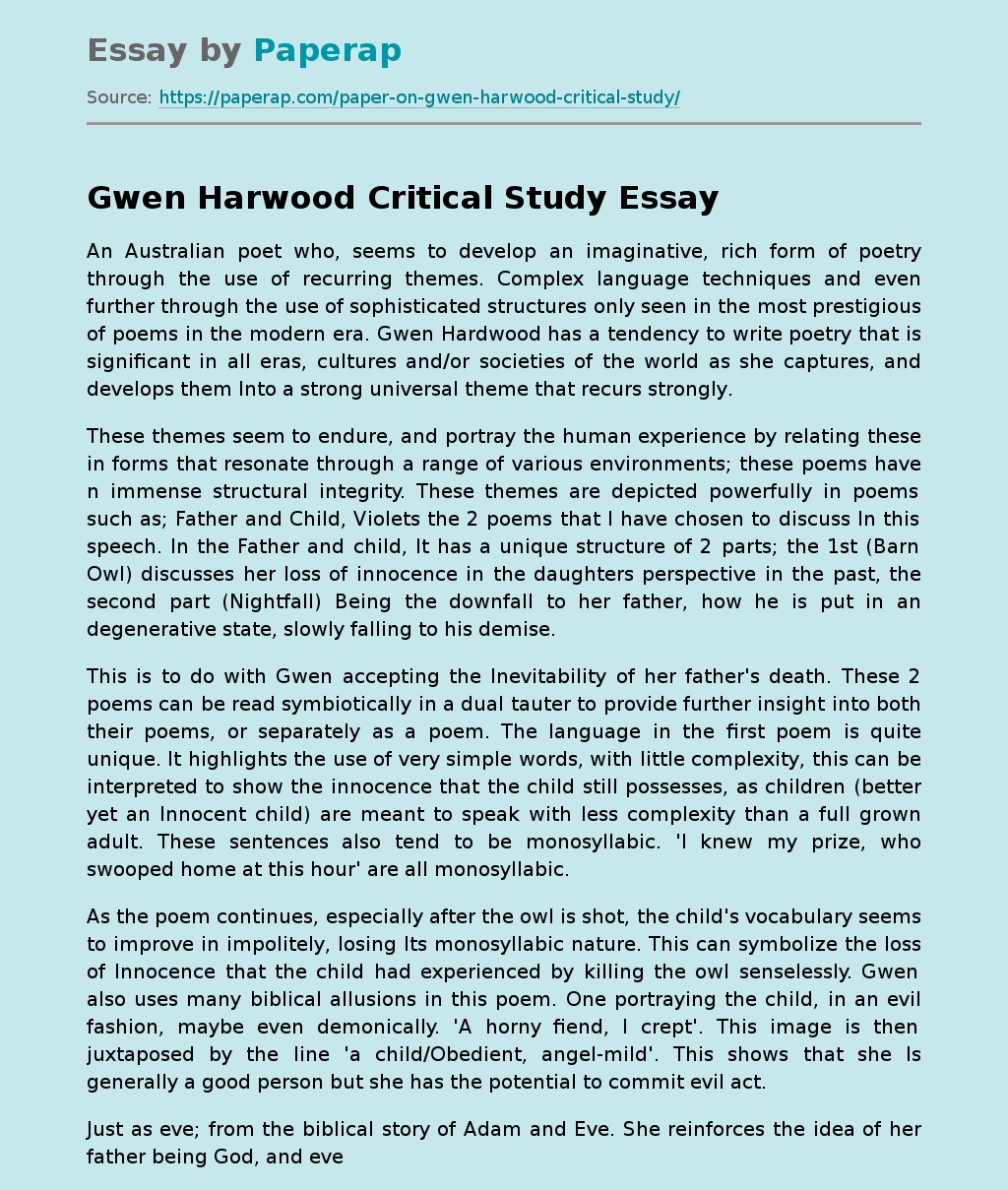An Australian poet who, seems to develop an imaginative, rich form of poetry through the use of recurring themes. Complex language techniques and even further through the use of sophisticated structures only seen in the most prestigious of poems in the modern era. Gwen Hardwood has a tendency to write poetry that is significant in all eras, cultures and/or societies of the world as she captures, and develops them Into a strong universal theme that recurs strongly.
These themes seem to endure, and portray the human experience by relating these in forms that resonate through a range of various environments; these poems have n immense structural integrity.
These themes are depicted powerfully in poems such as; Father and Child, Violets the 2 poems that I have chosen to discuss In this speech. In the Father and child, It has a unique structure of 2 parts; the 1st (Barn Owl) discusses her loss of innocence in the daughters perspective in the past, the second part (Nightfall) Being the downfall to her father, how he is put in an degenerative state, slowly falling to his demise.
This is to do with Gwen accepting the Inevitability of her father’s death. These 2 poems can be read symbiotically in a dual tauter to provide further insight into both their poems, or separately as a poem. The language in the first poem is quite unique. It highlights the use of very simple words, with little complexity, this can be interpreted to show the innocence that the child still possesses, as children (better yet an Innocent child) are meant to speak with less complexity than a full grown adult.
These sentences also tend to be monosyllabic. ‘l knew my prize, who swooped home at this hour’ are all monosyllabic.
As the poem continues, especially after the owl is shot, the child’s vocabulary seems to improve in impolitely, losing Its monosyllabic nature. This can symbolize the loss of Innocence that the child had experienced by killing the owl senselessly. Gwen also uses many biblical allusions in this poem. One portraying the child, in an evil fashion, maybe even demonically. ‘A horny fiend, I crept’. This image is then juxtaposed by the line ‘a child/Obedient, angel-mild’. This shows that she Is generally a good person but she has the potential to commit evil act.
Just as eve; from the biblical story of Adam and Eve. She reinforces the idea of her father being God, and eve going behind her father o seek power, Just as Eve did when she bit into the apple for intelligence. As the owl Is also considered to be symbolically wise, it can be interpreted that the owl is also the fruit from the forbidden tree’ as In the story of Adam and Eve. The snake (Satan). Convinces Eve to eat from the tree, as it would make her eternally wise; which would allow her to grow in power, Just as the child had believed that killing the owl would allow her to grow in power.
The poem seems to also state that she is the master of life and death’ and she Isn’t referred to as a mistress, In a literal sense, It refers to her s a male, even though she is a female. This helps promote the idea that she losses some of her femininity. The second part to the poem also refers to it as ‘nightfall’ this creates significance by also further enticing the idea that her father is slowly passing away and that she realizes that there Is not much time left.
These themes combined all portray the idea of a recurring theme, the recurring theme that has made this poem so influential through many generations and views, a theme that resides in all 1 OFF ‘The violets’ is the triggering of a memory after the subtle act of picking up a violet. This poems language structure is quite unique, it utilizes going from the present to past tense repetitively recollecting past experience the user has been through continuously making further sense of the present.
The memories that are conjured are of happiness, she does develop a feeling of change or emptiness, further enhancing the recurring theme of loss. The reader uses 1st person to fully capture the personality of the experience she writes about. As the writer has lost these experience in the present day, she still has vivid memory of the past, in which she wishes to keep secure this is shown in the line frail melancholy flowers’ as the lowers is what triggered the memory, she refers to them as frail, that can be easily damaged, this is why she wishes for the security of them.
She is afraid of the loss of these memories. Where’s morning gone? Is a line that further emphasizes her innocence, or in the bigger picture; her loss of innocence. As a child she asks, Where’s morning gone’ personifying time, or the morning. Instead of simply understanding, the fact that she has slept her way through the day. This can also refer to the interpretation that she feels as if she had metaphorically ‘slept’ her way wrought life, but it can also be interpreted as the loss of innocence, as she had Just let her childhood float’ away.
By revisiting this memory, the child persona further establishes the inevitability of death, Just as she had done in ‘Father and Child’ She realizes that time will not stop for anybody, this can be depicted by the line Years cannot move’ Gwen Hardwood, as recently stated uses these recurring themes and language techniques to create structurally sounds poems that resonate throughout various societies and shall continue to by the consistent use of universal themes. Thank you.
Gwen Harwood Critical Study. (2017, Nov 25). Retrieved from https://paperap.com/paper-on-gwen-harwood-critical-study/

